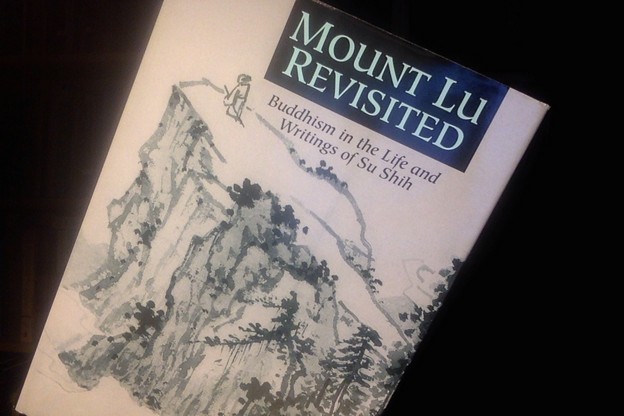Twenty-six items from Special Collections (q)
Exhibit 'Q': Chinese. (Su Dongpo, ['He is like white clouds …'], circa 1095 CE)

Bibliography: Mount Lu Revisited: Buddhism in the Life and Writings of Su Shih, Beata Grant (University of Hawaii Press, 1994). The poem appears on pages 161–2.
Comment: I first encountered the piece below in one of those little books in the Everyman's Library Pocket Poets series—namely Zen Poems, selected and edited by Peter Harris (Knopf, 1999). Those little anthologies—handy, eccentric, uneven, unfair—are, in my judgment, the best little anthologies in English. I would love to know more about how they are made.
The book pictured above was the editor's source text for the poem below. This book is not a collection of Su Dongpo's poetry. It is a scholarly monograph, illuminating the place of Buddhism in the poet's life. Beata Grant, the author, has as far as I know never published a book of poetry, neither her own nor a translation of anybody else's. The fact that her document is transfused with translated poetry is strictly a matter of illustrating Su's relation to his religion and his milieu. All of which is to say: It was no casual search in obvious places that produced the Everyman Zen Poems.
Meanwhile, this Beata Grant, whoever she is, really does have the touch. There is a trancey rhythmic quality to the English below that shows a lively appreciation for the very rhythmic original. This is a trait seldom encountered in translations from medieval Chinese—I think mainly because love of strong rhythm has been out of fashion in USA art-poetry for about a century.
With the present post I have done something unusual. Below, the reader will find the poem, just as it appears in Mount Lu Revisited, but I have added, as an appendix, my own redaction of the same text, with line breaks done according to my own ideas (conservative, arbitrary, closed-minded ideas) + pinyin rendering of Chinese names. This turns the poem into something of an Urdu ghazal—an effect I hope will be judged stimulating.
["He is like white clouds . . . "]
He is like white clouds rising from the mountains—
No-mind from the start,
He is like the roosting bird who feels no longing
For the woods of home.
But because this man of the Way happens to enjoy
The mountains and streams
He wanders among them unconcerned about how deep
Into the lakeside mountain peaks he goes.
He has gone to the empty cliffs to worship
The hundred thousand forms of the Buddha,
And now wishes to visit Ts’ao-hsi and pay his respects
To the relics of the Sixth Patriarch.
If you want to know whether the water is hot or cold,
You must taste it for yourself.
I am beginning to think the dream I had of you
Was not an illusion after all!
In that dream you suddenly pulled from your sleeve
A sutra written on papyrus leaves,
Its lines and phrases jade-pure as the moon,
And stars strung together like pearls.
There are many beautiful spots in this world,
And he has just about seen them all:
From the southern peaks of Mount Lu
All the way to West Lake—
West Lake, which, if one looks to the north,
Lies three thousand li away,
Its great dike stretching out unbroken
Across the autumn waters.
As I chant the verses the master wrote
Describing the beauty of Mount Nan-p’ing,
The miasmic summer airs of Hui-chou
Seem to vanish in an autumn breeze.
Is it possible that the pleasure of your company
Will end in but ten short days?
Cutting through the brambles, it won't be easy
To find the road home again.
The wild greens I use to entice the master to stay
Are not much to speak of:
Oh how I look forward to the season
When the lichees turn red.
•
Appendix: Madrid redaction.
He is like white clouds rising from the mountains—no mind from the start,
He is like the roosting bird who feels no longing for the woods of home.
But because this man of the Way happens to enjoy the mountains and streams,
He wanders among them unconcerned about how deep into the lakeside mountain peaks he goes.
He has gone to the empty cliffs to worship the hundred thousand forms of the Buddha,
And now wishes to visit Caoxi and pay his respects to the relics of the Sixth Patriarch.
If you want to know whether the water is hot or cold, you must taste it for yourself.
I am beginning to think the dream I had of you was not an illusion after all!
In that dream you suddenly pulled from your sleeve a sutra written on papyrus leaves,
Its lines and phrases jade-pure as the moon and stars strung together like pearls.
There are many beautiful spots in this world and he has just about seen them all:
From the southern peaks of Mount Lu all the way to West Lake—
West Lake, which, if one looks to the north, lies three thousand li away,
Its great dike stretching out unbroken across the autumn waters.
As I chant the verses the master wrote describing the beauty of Mount Nanping,
The miasmic summer airs of Huizhou seem to vanish in an autumn breeze.
Is it possible that the pleasure of your company will end in but ten short days?
Cutting through the brambles, it won't be easy to find the road home again.
The wild greens I use to entice the master to stay are not much to speak of.
Oh how I look forward to the season when the lichees turn red.
•
Twenty-six items from Special Collections